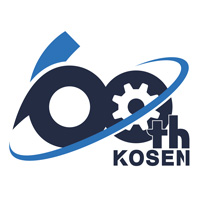Regular Course
RA: To develop the students’ abilities and inculcate awareness of their cultural heritage and its values.
1. With an understanding of Japanese society the students will become more aware of their language, the traditions of their country and its long and rich history.
2. The students will recognize and appreciate the regional diversity in art and culture of Japan.
RB: To develop the students’ rudimentary abilities in Mathematics, sciences, and their specific fields of specialization. Furthermore, to ensure students are aware of contemporary environmental issues in scientific /technological advancements.
1. The students will understand the mathematical and scientific fundamentals necessary for a career in engineering and science.
2. The students will develop their ability to process information, and understand technological change with the knowledge and skills they have learned in their special fields.
RC: To develop fundamental communication skills to work actively in a globalized society.
1. The students will understand basic dialogs and passages and express their own opinions about these readings.
2. The students will accurately understand and appreciate Japanese passages or literary works, and properly express their thoughts and ideas in Japanese.
3. The students will construct easy-to-understand graphs and charts and thereby give clear explanations in Japanese.
RD: To develop students’ design skills necessary for Engineering.
1. The students will identify problems, solve problems, and develop their problem solving competence.
RE: To acquire practical and critical thinking skills.
1. The students will analyze data of their own experiments and research work and compare the data they acquired with theoretical hypotheses and discuss the differences critically.
2. The students will research the background of each task they are given. After the background research they will learn to select the most appropriate method to perform their experiment or orient their research. Finally, they will explain critically and objectively the results they received through data analysis.
3. The students will set appropriate goals according to their abilities and find solution to their individual or group task in order to gain knowledge and practicality in the field of health and sports.
Advanced Engineering Course
Multidisciplinary Engineering Program accredited by JABEE.
JA: To develop cultural sensitivity, respect differences in cultural values, and develop a global perspective.
1. The students will learn to appreciate the multicultural diversity of the world and develop their own inherent sensitivities and values.
2. The students will learn to understand the impact of human activities and civilization on the earth’s environment with a view to building a sustainable global society.
3. The students will learn to clearly understand the social responsibility that engineers will have to acknowledge and to fully understand the code of ethics specified by engineering organizations.
JB: To develop the skills required to collaborate with various technological fields during a project. Our intention is that students will develop these skills while learning mathematics, information processing and manufacturing skills.
1. The students will have sufficient knowledge of mathematics and other sciences to solve engineering problems.
2. The students will have the sufficient knowledge of information processing necessary to help them to understand and solve engineering problems.
3. The students will become aware of the impact of their roles as engineers in society and be able to extend their academic interests besides their special field of engineering to cope with the manufacturing process, fully aware of building a sustainable society.
JC: To acquire basic communication skills required for engineers who are working internationally.
1. The students will be able to understand general topics in daily life and express themselves competently in English.
2. The students will be able to explain in Japanese the contents of English papers in their fields of specialty.
3. The students will be able to express their own ideas and viewpoints in discourse and writing in Japanese, using clear and descriptive expressions.
4. The students will be able to make oral presentations or attend discussions in Japanese, and to respond to questions from the audience appropriately.
5. The students will be able to construct easy-to-understand graphs and figures.
JD: To acquire the fundamental engineering design skills.
1. The students will learn about specific manufactured and industrial products already available and used which will help them design their final product. The students will also understand the function, the comparative safety, as well as the economic feasibility of these objects in their designs. Finally, the students will understand the environmental impact of using these products.
2. The students will understand the problems which will arise as they develop new products. They will learn to distinguish between new phenomena from old phenomena as they do their research and development. From the results the students will note the differences in their research data and results.
3. The students will be able to discuss problems creatively from various viewpoints and to coherently present the results.
4. The students will be able to discover a number of potential solutions through cooperative team discussions among members of different specialties and to choose the most appropriate solutions.
JE: To acquire the practical skills necessary in an engineering environment and the critical thinking skills required in professional environments.
1. The students will learn to understand the technological significance of the assigned experiments and exercises. They will learn to produce the appropriate outcome before the deadline by pursuing and establishing the required methods.
2. The students will develop statistical methods and data analyses to analyze their experiments and simulations.
3. The students will become aware of practical technological problems that engineers experience and to become able to present them concretely.
4. The students will learn to make specific, detailed plans to achieve their research goals.
5. The students will learn to discuss their views in professional discussions coherently. Further they will learn to recommend solutions from their experimental and analytical results.
 National Institute of Technology, Fukui College
National Institute of Technology, Fukui College

